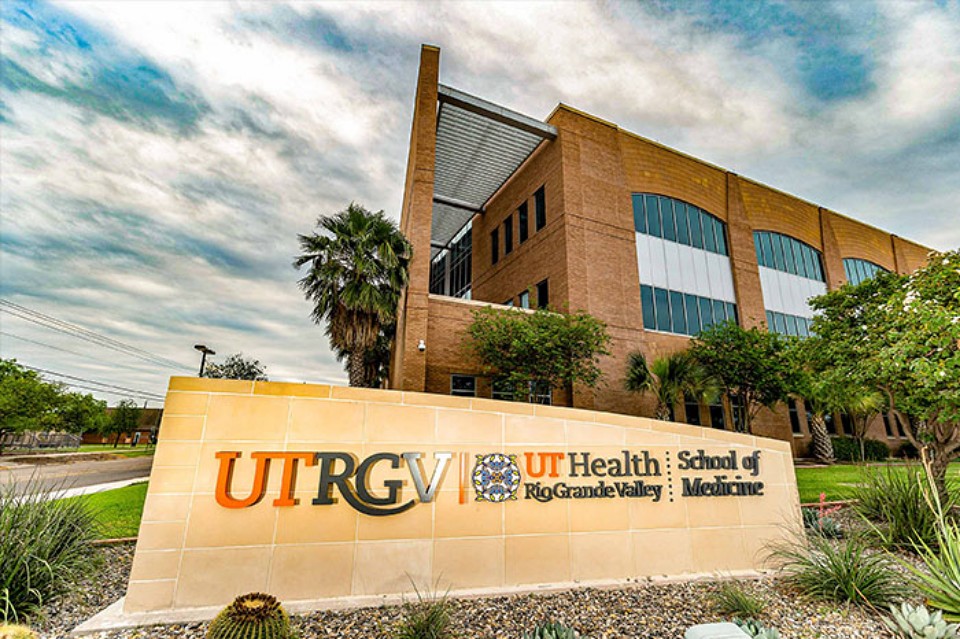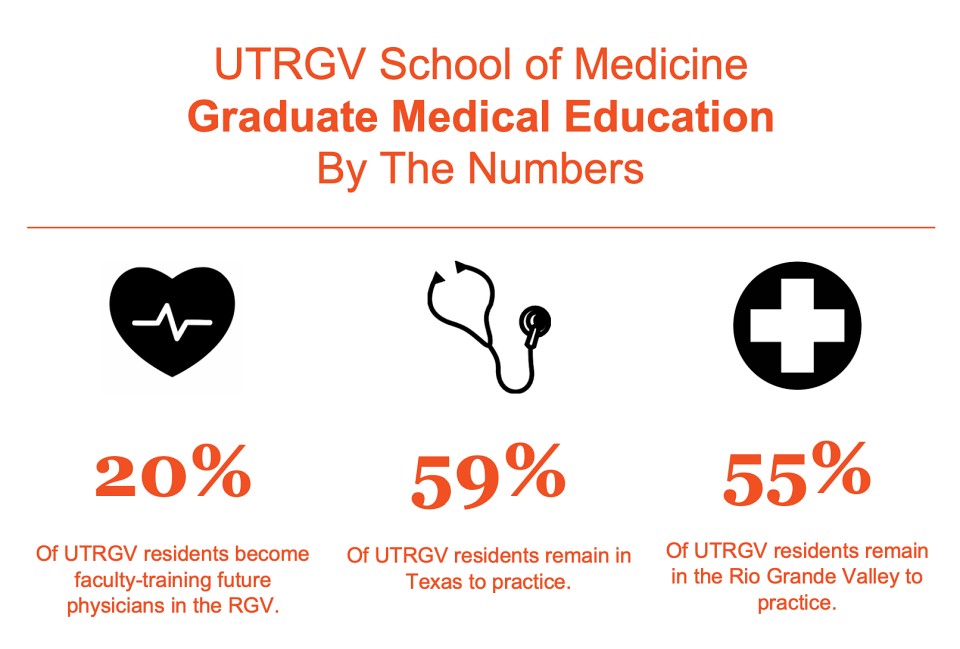By Dimitra Trejo
RIO GRANDE VALLEY, TEXAS – The UTRGV School of Medicine’s physician training program has been granted continued accreditation from the national council charged with evaluating and accrediting Graduate Medical Education (GME) programs across the United States.
In a letter dated Jan. 11 from the Accreditation Council for Graduate Medical Education (ACGME), the council – based on the recommendation of the Institutional Review Committee (IRC) – found the university’s GME program in continued good standing.
“The Review Committee commended the institution for its demonstrated substantial compliance with the ACGME's Institutional Requirements,” the ACGME letter states.
The UTRGV School of Medicine’s GME program oversees and sponsors 19 different residency and fellowship programs in the Rio Grande Valley.
The programs are the next step after medical school, and are designed to prepare doctors for the independent practice of medicine and help them develop the commitment to life-long learning that is critical for maintaining professional growth and competency.
ACGME institutional requirements state that the residency and fellowship programs accredited must function under the ultimate authority and oversight of one sponsoring institution, in this case, the UTRGV School of Medicine.
The requirements also state that the oversight of resident / fellow assignments, and of the quality of the learning and working environment by the sponsoring institution, extends to all participating sites.
The UTRGV School of Medicine’s GME program has been accredited continuously by the ACGME since 2014.
SETTING THE BAR
Dr. Michael B. Hocker, dean of the UTRGV School of Medicine and senior vice president for UT Health RGV, said the ACGME continued recognition reflects the high standards the GME program has set for itself in training resident physicians.
“We are extremely proud of the ACGME’s recognition of our GME program,” Hocker said. “We will continue to offer training opportunities to physicians as they complete their journey in medicine. Our ability to produce highly skilled providers who are serving our community is part of our commitment to bringing academic medicine to the Valley.”
UTRGV President Guy Bailey said this newest accreditation is reflective of the diligent work being done at the School of Medicine, not just today but since its creation.
“We have seen first-hand the continued stamps of approval our School of Medicine has earned from national accrediting bodies like the ACGME and the Liaison Committee on Medical Education (LCME) since we first opened our doors,” Bailey said. “And I am positive the UTRGV School of Medicine will continue to be recognized for its innovative research, and for the excellent clinical and educational opportunities it provides.”
FILLING A NEED
The 19 UTRGV GME programs are made up of partnerships between the School of Medicine and Valley hospitals that train resident physicians.
The program has an estimated 256 doctors in training this year alone, in residency and fellowship programs at Valley hospitals including McAllen Medical Center, Valley Baptist Medical Center, Doctors Hospital at Renaissance and Knapp Medical Center.
Dr. Chelsea Chang, assistant dean of the Graduate Medical Education program at the UTRGV School of Medicine, said the program has trained more than 284 residents since 2014 and will help meet the demand for physicians in Texas.
“Our GME program is making lasting impacts on healthcare in the region and in the state,” Chang said. “Our mission-driven program has produced a 20% retention rate of residents as faculty who will train future physicians.
“From 2016-2022, 59% of our residents remained in Texas to practice,” she said, “and 55% of our residents remained in the Rio Grande Valley. We are filling healthcare gaps and helping avoid future ones,” she said.
UTRGV’s GME residents and fellows reflect the diversity and needs of the growing population:
- 46% are women.
- 56% are underrepresented minorities in medicine, to include American Indian, Black / African American, and Mexican American.
Amy Knudsen, GME program manager for the UTRGV School of Medicine, said that in Texas and across the country, it has been an uphill battle to fill the void of physicians needed to serve. However, the UTRGV School of Medicine’s GME program has worked hard to make serious progress in the Valley.
“The Texas physician-to-population ratio is 205 per 100,000, according to the Texas Hospital Association. And the national physician-to-population ratio is 259 per 100,000,” Knudsen said.
“Given those numbers, the estimated 300 physicians who have gone through our UTRGV programs definitely will have a positive impact on the need for doctors, not just in the Rio Grande Valley or Texas, but well beyond.”
To learn more about UTRGV SOM GME programs click here.
ABOUT UTRGV
The University of Texas Rio Grande Valley (UTRGV) was created by the Texas Legislature in 2013 as the first major public university of the 21st century in Texas. This transformative initiative provided the opportunity to expand educational opportunities in the Rio Grande Valley, including a new School of Medicine and a School of Podiatry, and made it possible for residents of the region to benefit from the Permanent University Fund – a public endowment contributing support to the University of Texas System and other institutions.
UTRGV has campuses and off-campus research and teaching sites throughout the Rio Grande Valley including Brownsville (formerly The University of Texas at Brownsville campus), Edinburg (formerly The University of Texas-Pan American campus), Harlingen, Weslaco, McAllen, Port Isabel, Rio Grande City and South Padre Island. UTRGV, a comprehensive academic institution, enrolled its first class in the fall of 2015; the School of Medicine welcomed its first class in the summer of 2016, and the School of Podiatric Medicine in the fall of 2022.


